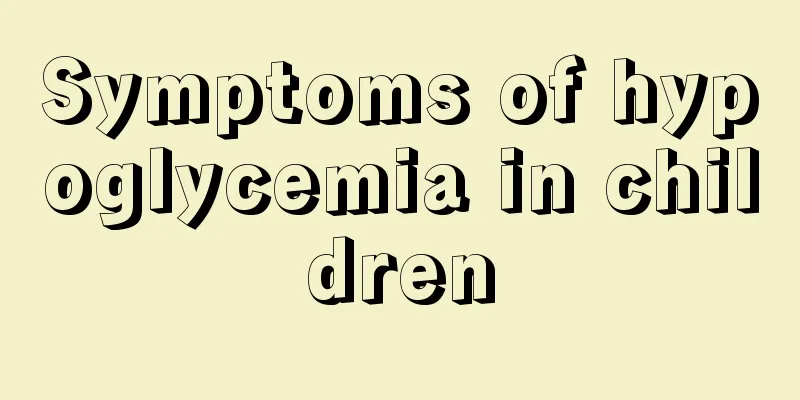Symptoms of hypoglycemia in children

|
Children's bodies can easily lack trace elements such as potassium, zinc, and calcium, but few people know that children can also suffer from hypoglycemia. Hypoglycemia in children is a very obvious sign of physical weakness, and it often occurs in children who are premature, have heart disease, or other congenital poor health conditions. Children with hypoglycemia usually suffer from anorexia and grow much thinner than children of the same age. This disease is related to maternal and familial genetic diseases. Due to hypoglycemia, children's limbs are prone to coldness, and they have a clear aversion to the fruits and sweets that they like to eat, and may even vomit. Symptoms of hypoglycemia in children Hypoglycemia in children is asymptomatic or has no specific symptoms, and is usually manifested by poor response or irritability, feeding difficulty, abnormal crying, low muscle tone, irritability, convulsions, respiratory arrest, etc. After sugar supplementation, the symptoms disappeared and blood sugar returned to normal. Hypoglycemia is usually temporary. If it recurs, glycogen storage disease, congenital pituitary insufficiency, glucagon deficiency, and cortisol deficiency should be considered. The paper strip method is often used to monitor blood sugar in patients with suspected hypoglycemia. Patients with persistent and recurrent hypoglycemia should undergo further auxiliary examinations. Causes of hypoglycemia in children 1. Too little glucose production (1) It occurs in premature infants and infants small for gestational age, and is mainly related to insufficient storage of liver glycogen, fat, and protein and low gluconeogenesis function; (2) Sepsis, cold injury, and congenital heart disease are mainly caused by insufficient calorie intake, high metabolic rate, increased sugar requirements, and low gluconeogenesis; (3) Congenital endocrine and metabolic defects often cause persistent and intractable hypoglycemia. 2. Increased glucose consumption It is more common in infants of diabetic mothers, Rh hemolytic disease, Beckwith syndrome, asphyxia and infantile islet cell hyperplasia, all of which are caused by hyperinsulinemia. 3. Pay attention to whether there is family heredity, maternal diabetes and gestational hypertension, and pay attention to the age of onset. For newborns, the birth weight, placental condition, family heredity history, maternal diabetes and gestational hypertension syndrome history should be understood. Pay attention to the causes and characteristics of hypoglycemia, such as cold and hunger. Birth trauma, hypoxia, asphyxia, infection, neonatal hemolytic disease, use of ethanol, salicylates and other blood sugar-lowering drugs. Does the child hate fruits or sweets? Does he often vomit or have diarrhea after eating? Does he have a high-protein diet or feeding? Is there any connection between it and the onset of the disease? Does the disease often occur in the early morning on an empty stomach? |
<<: What is the cause of the child's bad teeth?
>>: Baby's ear wax forms hard lumps
Recommend
Can babies eat complementary foods if they have diarrhea?
After the baby is weaned, mothers should consider...
Causes of occult blood in newborn stool
We all know that once the baby has blood in the s...
Can a one-year-old baby eat walnut porridge?
I believe everyone knows that walnuts have the ef...
Baby sweats a lot on his head while sleeping
When babies are young, parents always watch over ...
Causes of nosebleeds in children
Nosebleed is a common condition in children, espe...
How many months should babies suck their fingers?
It is a common phenomenon for babies to suck thei...
Does anyone know how many times a full-month baby poops a day?
A newborn baby is like a newborn bud, tender and ...
What will zinc deficiency cause? Zinc deficiency is very harmful to children
Many children have symptoms of zinc and calcium d...
What are the anti-inflammatory drugs for children's colds?
Children are most likely to develop cold symptoms...
Ways to improve children's immunity
We all know that children's physical resistan...
Precocious puberty in young girls
Generally speaking, girls will not show symptoms ...
What is the best way to treat children's ADHD?
Children with ADHD are a concern for many parents...
What should I do if my child has diarrhea and fever?
Children often catch colds and fevers during thei...
What to do if your child has a fever
Because children's resistance is poor, they a...
Four major causes of myopia in children
Myopia is a common eye disease, which is mostly c...









